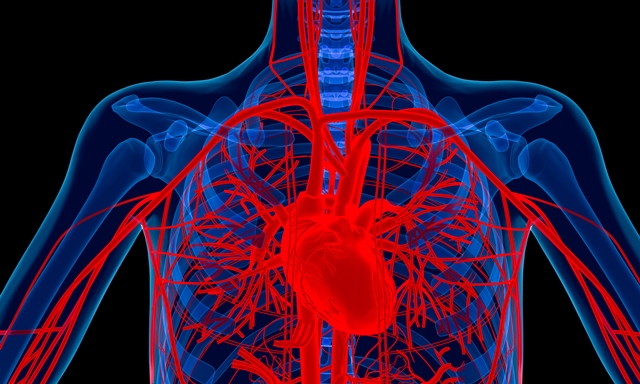20 Nov. 2023. Data from three health repositories show a simple blood test reveals inherited and acquired genetic indicators, analyzed with artificial intelligence, to detect coronary heart disease. A team from the biotechnology company Cardio Diagnostics Holdings Inc. in Chicago describe their findings from population health data sets and technology in today’s issue of the Journal of the American Heart Association.
Cardio Diagnostics is a six year-old company that seeks to provide simpler and more accessible diagnostics for coronary heart disease, the most common form of heart disease, responsible for more than 375,000 deaths in the U.S. in 2021. Coronary heart disease results from a build up of cholesterol plaques in the large arteries supplying blood to the heart, which can narrow and then block blood flow to the heart. The disorder, also called coronary artery disease, is a major risk factor for heart attacks and heart failure.
The authors note, however, that most of today’s diagnostic tools for coronary heart disease are invasive, expensive, or not sensitive. Exercise stress tests with electrocardiograms or ECGs are non-invasive, but can cost more than $1,100, say the authors, yet return a true-positive sensitivity rate of only 58 percent. An angiogram has a sensitivity rate of 97 percent, but requires an invasive catheter, with contrast agency chemicals and X-rays that can be harmful to some patients. In addition, say the authors, an angiogram can cost more than $9,200.
Hydrocarbon chemicals influencing gene functions and expression
The Cardio Diagnostics solution is a simple blood draw tested for coronary heart disease and analyzed for biomarkers, molecular indicators from inherited genetics and epigenetics, chemical changes in DNA since birth, usually from lifestyle or environmental exposures. The paper’s authors note that epigenetics influenced by smoking or diets high in saturated fats often contribute more to heart disease than inherited genetics. The company’s test, called PrecisionCHD, analyzes blood samples with algorithms to identify inherited and epigenetic DNA contributing to coronary heart disease, particularly methylation signatures: addition of hydrocarbon chemicals that influence gene functions and expression.
Cardio Diagnostics trained the PrecisionCHD machine learning algorithms with data from the Framingham Heart Study, a pioneering long-term assessment of cardiovascular health among residents of Framingham, Mass. across multiple generations. The authors say the algorithms are based on data from 1,545 subjects in the Framingham study using genetic, methylation, and demographic data that accurately detects coronary heart disease in 78 percent of cases, with true-positive sensitivity of 75 percent, and true-negative specificity of 80 percent.
The new paper seeks to validate the PrecisionCHD algorithms by extending the analysis to two independent population health collections — from the Intermountain Health system in Salt Lake City serving Utah and adjoining states, and University of Iowa Hospitals and Clinics in Iowa City — as well as a separate sample from the Framingham Heart Study. Records and blood samples from the three repositories were randomized between those diagnosed with coronary heart disease, and those without the condition, resulting in 449 cases of people with coronary heart disease and 2,067 as the control group. The results show a PrecisionCHD test accuracy of 82 percent, with 79 percent sensitivity, and 76 percent specificity.
Robert Philibert, lead author and chief medical officer of Cardio Diagnostics, calls the findings “a game changer for personalized cardiovascular care” in a company statement, and adds the approach can “provide a more comprehensive, personalized snapshot of a patient’s CHD drivers, allowing for early intervention and tailored treatment plans.” Philbert founded Cardio Diagnostics with Meesha Dogan, a co-author and company CEO, who notes the technology can particularly help patients “in rural areas where advanced diagnostic tools are scarce and cardiovascular specialists are even more rare.” Philibert and Dogan received their doctorates in medicine and biomedical engineering respectively at University of Iowa.
More from Science & Enterprise:
- Cardiac Tech Start-Up Partners with Mayo Clinic
- A.I. Analytics Detect Heart Failure in Single Ultrasound View
- Audio Digital Biomarkers Start-Up Raises $3.7M in Seed Funds
- FDA Clears AI Heart Failure Detection System
- Peptide Vaccine Shown to Reduce Harmful Cholesterol
We designed Science & Enterprise for busy readers including investors, researchers, entrepreneurs, and students. Except for a narrow cookies and privacy strip for first-time visitors, we have no pop-ups blocking the entire page, nor distracting animated GIF graphics. If you want to subscribe for daily email alerts, you can do that here, or find the link in the upper left-hand corner of the desktop page. The site is free, with no paywall. But, of course, donations are gratefully accepted.
* * *


 RSS - Posts
RSS - Posts
You must be logged in to post a comment.